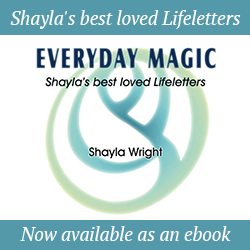There seems to be a kind of inner restlessness, a divine unease, bubbling up in all kinds of people these days, in relation to their work.
“I used to be okay with this job,” they say, “but now, it just doesn’t feel quite right. I feel like I should be doing something else, something different.”
“What do you want to do?” I ask
“I don’t know. That’s the hardest part. I just can’t imagine what it could be… I’d just like to participate in something, be a part of something, and be of benefit.”
“Ah yes,” I say, “that’s it, isn’t it? There’s something deep in the heart, something totally natural and uncontrived, that wants to fully participate in life, and be of benefit.”
“Yes,” they reply. “I can feel it, and it doesn’t go away. But what is it? I really don’t know.”
It amazes me how easily we can feel that not knowing is a terrible problem. We interpret it as a closed door, a sign of something wrong. That’s how we’ve been trained, almost all of us – to think that knowing is good, and that not knowing will get us into trouble. When we believe this perception, we create suffering for ourselves. We reject what we actually have, which is the space of not knowing. And when we reject what we have we do not empower ourselves. The only way to empower ourselves, to treat ourselves well, to respect ourselves, is to work with what we have.
So this not knowing is actually an invitation. It’s like a wide-open dark space, a garden, naked in the spring, before the planting. In this space of not knowing we can ask, and listen, and pray. You may think you don’t know how to do these things, but all they really require is the willingness to be with not knowing, to allow ourselves to feel the softness and the tenderness, the vulnerability, without pushing it away.
Into this open, dark space we can drop our questions: ‘What do I really want to do?’ ‘What is calling me, tugging at my heart, at my body?’ Can I find the patience to live with this question, the way a mother holds her child? No-one else can really hold this question for me. It may be difficult, frightening, because who knows where it will take me? Who knows where the deep wild stream of my authentic being will carry me?
The answer comes in any number of ways. Little clues can appear in a song, an email, or a phone call. Sometimes in the bath, or on a walk, an image or a memory appears from nowhere, and I realize, “Oh, maybe I could do that.” It’s a lot like being on a treasure hunt, or stalking a wild animal: listening, breathing, listening – trusting that there is a movement inside me, like a river, or a sprouting seed, something that is ready to expand, evolve, and move far beyond what is comfortable and safe.
A dear friend of mine told me that he took a shamanic journey recently, and heard something, some deep part of himself speak out with great authority. It said, “Now is the time for you to move into the unknown.” His entire being received this news with great joy. He was filled with a profound sense of aliveness and mystery. Later on his mind came back and started doing its thing: “You can’t live like that. It doesn’t make any sense.”
Our conditioned mind is wired this way. It wants to be safe, secure and unthreatened. There’s nothing wrong with this at all. Without this mind we couldn’t survive for a day. But if we let this desire to know, to be safe and certain, dominate us, we pay a very high price.
We sacrifice our creativity, our innocence, and our aliveness. We forget about the part of us that is not limited in this way at all: spirit, awareness, presence, will take great risks and endure all kinds of difficulties, just to be of benefit, just to love. There was a German woman, Irena Sendler, who died last week at the age of 98. During World War II she got permission to work in the Warsaw ghetto as a plumbing/sewer specialist. She had an ‘ulterior motive’… She knew what the Nazi’s plans were for the Jews, being German.
Irena smuggled infants out in the bottom of the tool box she carried. In the back of her truck was a burlap sack, for larger kids. She also had a dog in the back that she trained to bark when the Nazi soldiers let her in and out of the ghetto. The dog’s barking kept the Nazis away and covered the sound of the crying children.
During her time in the ghetto, she managed to smuggle out and save 2,500 infants and children. She was caught, and the Nazi’s beat her severely, breaking her arms and legs. Irena kept a record of the names of all the kids she smuggled out, and kept them in a glass jar, buried under a tree in her back yard. After the war, she tried to locate any parents that may have survived, and reunite the family. Most had been gassed. Those children she saved got placed into foster family homes or adopted.
If you look at her picture she looks like she would take you into her house and give you tea and gingerbread. Just a lovely old grandmother, who was actually a living Bodhisattva. How did she find the courage to listen so deeply to her heart and spirit? And to follow it! What would happen if we let ourselves be moved by something deep inside us, without having to know what it is, or where it will take us?
For the innermost decision
That we cannot but obey
For what’s left of our religion
I lift my voice and pray.
(Leonard Cohen)
with love,
Shayla


Stay Connected